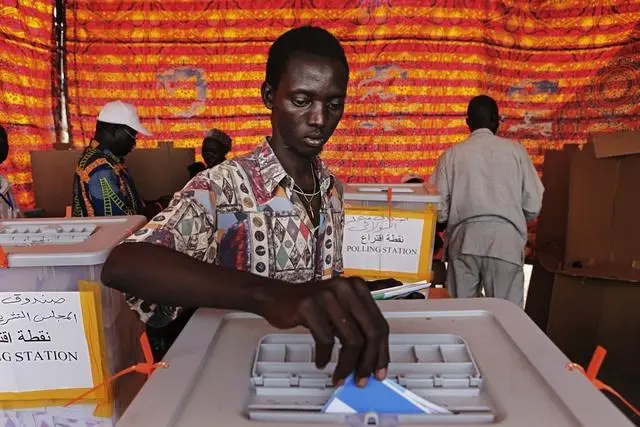You are here: Home | Featured | Governance | News | States | South Sudanese want elections in 2024 amid fear of violence: Survey

Man casts his ballot during the 2010 Sudan general elections. (-)
Majority of South Sudanese who took part in a 2024 Peace Perception Survey strongly suggest the conduct of elections on time, although about half the respondents express fear of electoral fraud and possible violence.
The research, authored by David Deng, Jan Pospisil, Sophia Dawkins and Christopher Oringa, is supported by the Peace and Conflict Resolution Evidence Platform (PeaceRep), funded by UK International Development from the UK government.
The opinion poll collected the views of 4,769 people in 15 locations across all ten states and one administrative area, between March and June this year.
It indicates that 71% of respondents think that South Sudan is ready for elections and say elections should happen as enshrined in the roadmap agreement.
The survey, however, finds that the support for holding timely elections varies among respondents as those from Internally Displaced Persons’ (IDPs) camps are more likely to say the country is not ready for elections.

Meanwhile, nearly 40 percent (38) of the respondents express considerable fear of election-related violence, and think that it is likely that elections will cause a return to full-scale civil war.
On the question of whether civic and political space is sufficient to provide for credible electoral campaigns and elections, the respondents showed mixed reactions.
About 44% of respondents said they feel ‘unsafe’ or ‘very unsafe’ speaking publicly about politically sensitive issues, and this figure rose to 68% of respondents in IDPs settlements.
The polling data suggests that South Sudanese do not just want to vote as soon as possible, but that they also think that elections can correct some of the most pressing problems in the country.
“Overall, a clear majority think that South Sudan will become less corrupt (74%), have improved service delivery (78%), and gain international respect (80%) after elections have been conducted,” the data suggests.
According to the poll, confidence in the election commission (NEC) is compromised by considerable fear of electoral fraud as almost half of respondents thought that fraud was likely and just 26% thought it was unlikely.
It recommends that policymakers could mitigate the risk of electoral fraud by placing emphasis on election observation, safeguarding the electoral process, and on political communication to prevent fraudulent behavior.
When asked who should lead in election observation, respondents predominantly point to Western partners, with the United States being the most popular, followed by the United Kingdom, European Union, and multilateral organizations, such as IGAD, the UN and the AU.
Neighboring states feature far less prominently as do civil society organizations, as the United States was also the most preferable model, followed by the European Union and the United Kingdom.
“These perceptions place high expectations on South Sudan’s peace partners, especially the Troika and the European Union, who have thus far shown a certain skepticism towards elections, given the difficult political, economic, and security context.”
“For this and other reasons, it is critical that the Western stakeholders present a clear position on elections that goes beyond raising concerns and calling upon the government to do more to create a conducive environment for elections.”
On the sequencing of elections, the polling data suggests that South Sudanese favor simultaneous elections at the national and state levels.
About 60 percent say elections for president, governors, national MPs and state MPs should happen at the same time, while 38% said they should be sequenced.
Further, respondent preferences for political parties have remained between the SPLM-IG and SPLM-IO as parties with the best vision for the country.

However, more than half of respondents think that both should agree to form a single party before elections, suggesting a certain appetite for a continued sharing of power between these two dominant political formations.
The opinion poll concludes that there is a clear connection between people’s willingness to vote and their fears about the impact that elections will have on conflict dynamics in South Sudan.
It underscores that South Sudanese want to see credible and fair elections held as soon as possible, but that this is a lofty demand that does not seem to be feasible by December 2024.
“A more pragmatic approach would be to hold elections at a politically opportune and technically feasible point in the future. A major question for policymakers is how the public would relate to an extension and what are the implications for their confidence in the transitional process.”
“In considering the options, policymakers should be guided by public opinion to guarantee that the electoral process is at least ‘good enough’ to provide for a credible and widely accepted outcome.
Support Eye Radio, the first independent radio broadcaster of news, information & entertainment in South Sudan.
Make a monthly or a one off contribution.
Copyright 2024. All rights reserved. Eye Radio is a product of Eye Media Limited.